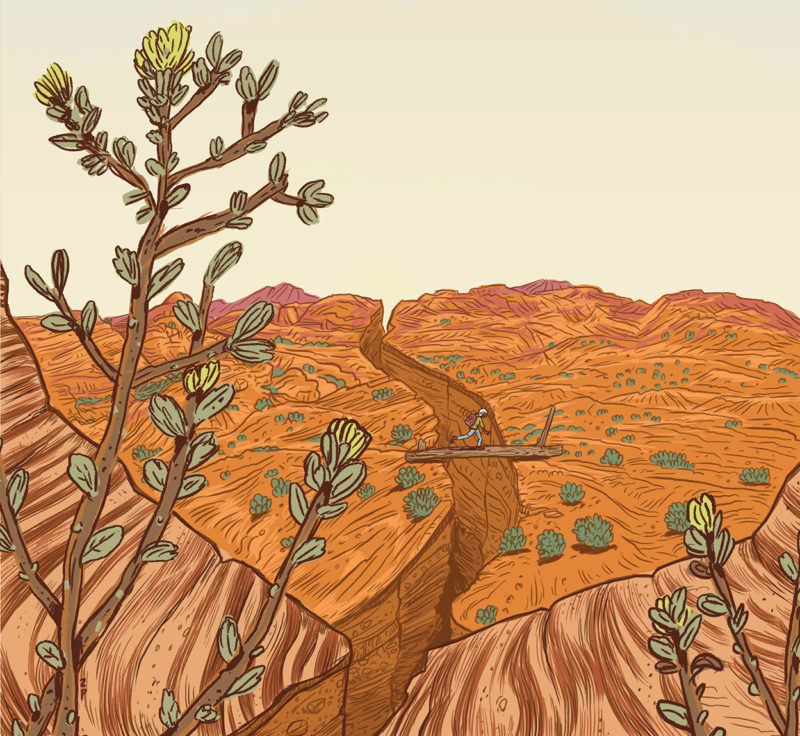Geography Lessons: Interviews from the 2019 Believer Festival in Las Vegas
Mari Brown and Ross Simonini
At this year’s Believer Festival, we cornered artists and activists at slot machines and on smoke breaks, asking them to riff on the meaning of the borders they’ve encountered in their lives and work. Weeks before, we’d made a firm decision to ask people, “What is the first geographical border you remember?” rather than the more expansive “What is the earliest border you remember?” We felt this was a way to keep the responses on a physical map at a moment in history when the public outcry about cruelty at the US border has exploded. But interviews don’t often go as expected. If we were to make a map using the borders from our conversations, you’d be able to take an intriguing road trip through a landscape of physical cities and metaphysical concepts. You might start out at “facial expressions on chairlifts,” wind through “Pennsylvania” and “silence,” stay for some time in “Tijuana” before passing through “marriage” and “precolonial Nigeria,” and come to rest, finally, somewhere between “Canada” and “the energetic aura, expressed as a kind of linguistic membrane, between me and my sister.” If that kind of travel appeals to you, try asking these questions of people in your own lives. You may arrive in new zip codes—some chorographic, some psychic.
—Mari Brown and Ross Simonini
NATALIE DIAZ
THE BELIEVER: What is the earliest border you encountered in your life?
NATALIE DIAZ: There were two embedded borders, one on top of the other. One was that I was living on a reservation, which had a very clear border, and on that reservation I knew I was also mixed: my father is Spanish and my mother is Native. On the reservation, which was my home, I should have been most comfortable, but I was different. But then as soon as I stepped off the reservation, I became a person from the reservation, so I didn’t have a full place in either place.
BLVR: What happened off the reservation?
ND: I became a sort of a commodity, in the sense that I was not like the others. I was very good at basketball, so I was often recruited by rich teams in Arizona to come play. They would pay my way to come play on their team so their teams could win, but these were places where I would never have been able to afford to go. I feel like I learned to play a game. Even now, when I go home, I speak very differently. If I’m off the reservation and I see another indigenous person, we recognize each other, and we look to each other for some kind of, like, footing, you know? Even though we’re also very clearly wanting to be autonomous and not considered the same.
BLVR: What do you see when you think of a boundary?
ND: I imagine a line being drawn. I imagine two things that are touching but are asked not to be touching.
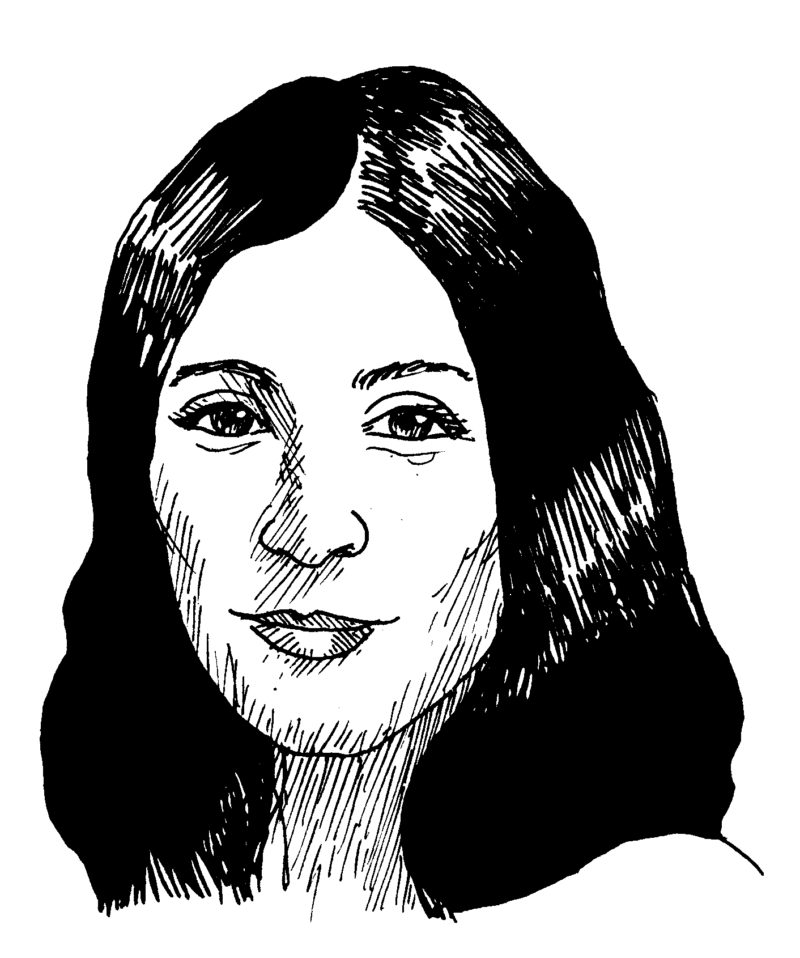
MIRA JACOB
THE BELIEVER: What is the first border you remember in your life?
MIRA JACOB: I’d say the first border that I remember was an invisible one. When I was in fifth grade, in Albuquerque, I won an essay contest sponsored by the Daughters of the American Revolution and they gave me the wrong directions to the awards ceremony. My teacher, who was this huge patriot, and I went to the place where they said they were gonna hold the ceremony and it was a dry cleaner. And she figured out that the ceremony was being held across town. She marched me in and I ended up reading my essay. It was this really weird thing. It didn’t make sense to me until much later, maybe when I was nineteen or twenty, when I understood that this thing that I thought was mine was not for me to claim. A place I had thought I had been let into had not actually let me in.
BLVR: What border do you enforce in your life?
MJ: I have a low tolerance for people who can’t have an uncomfortable conversation.
BLVR: And what about a geographical border?
MJ: We have a funny thing in my marriage. My husband and I both grew up in New Mexico, and I think he’s married to New York City—meaning I could leave New York City and he’d be like, It’s been wonderful knowing you. I’ll see you later. So I feel like I have a sort of self-imposed border of If I want my marriage to work, I will stay within New York City proper. Marriage is a mutually agreed-upon border.
HANIF ABDURRAQIB
THE BELIEVER: What is the first border you remember?
HANIF ABDURRAQIB: My mother wrote fiction. She would get home from work and go upstairs to her room. She had an old typewriter, and you could hear the keys, which were very loud, in the house when she was working. So I think the first border I understood was the border between myself and my mother’s creative pursuits. I couldn’t bug her or ask her questions or be a son in need of anything. It was difficult for me at the time, but now, as a writer, I understand it.
BLVR: What about the first geographical border that you encountered?
HA: Well, I’m from Ohio, and Ohio’s interesting because our border has shifted many times. But I think the first border I became aware of was the Ohio-Kentucky border. There’s a small bridge you can walk across.
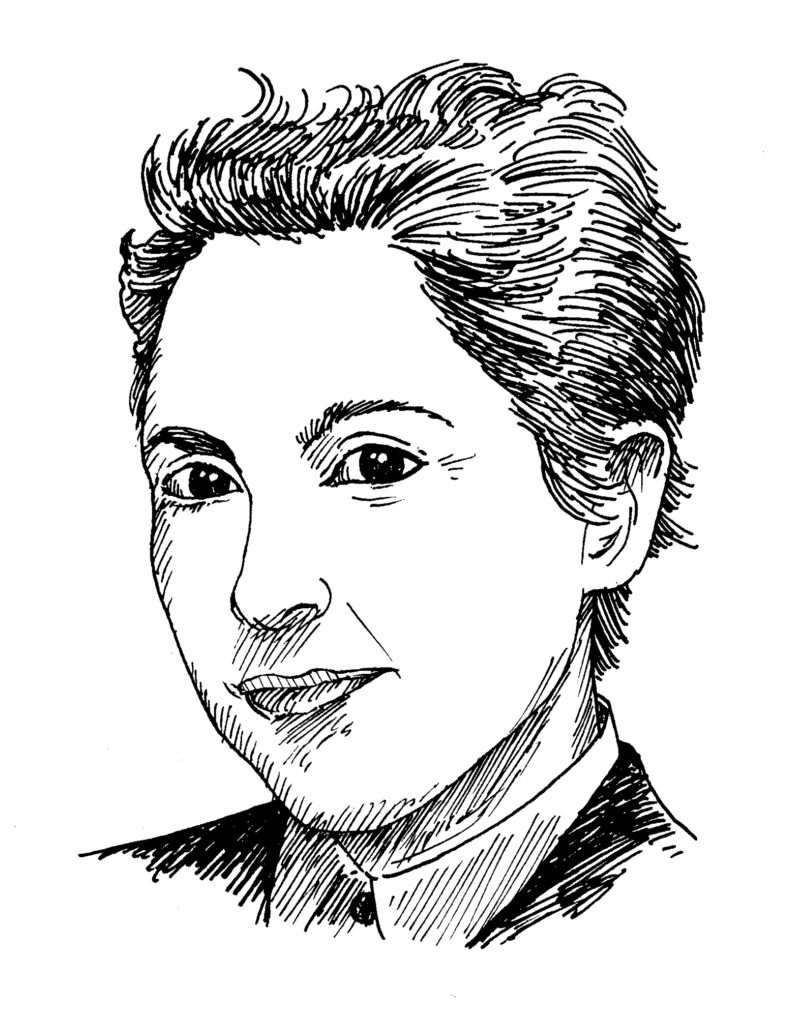
JILL SOLOWAY
THE BELIEVER: What’s the earliest border you remember?
JILL SOLOWAY: There was this drawbridge over the Chicago River, and as a kid I was obsessed with the idea of going over it when it was accidentally going up. I would have nightmares of it going up, of me not being able to get over, and of me sliding back down.
BLVR: What do you think that represented?
JS: The biggest possible fear.
BLVR: What’s on the other side of that bridge?
JS: I just keep thinking of this phrase, “The bridge is out.” A lot of people who are trying to figure out their relationship to their gender have used that phrase with me. They describe themselves as being a bridge that’s missing. I think it’s about the missing space, what’s in the missing space. The opening in that bridge over the Chicago River is the border. A border itself is a space; it is not like being on one side or the other.
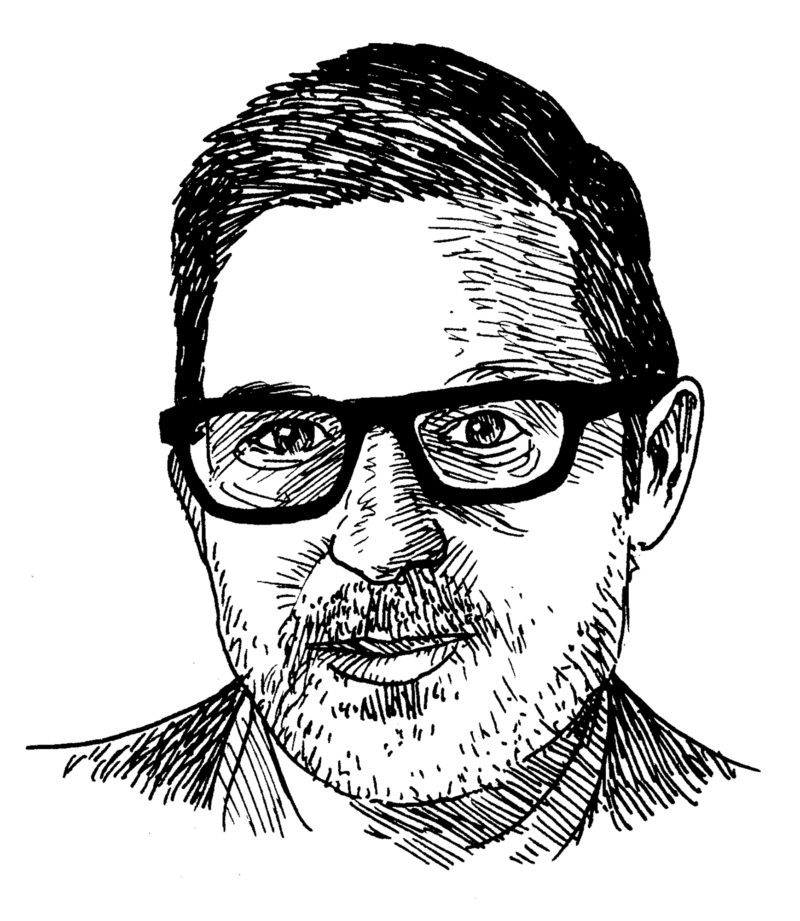
JOSH KUN
THE BELIEVER: What’s the earliest border you remember encountering?
JOSH KUN: This is a complicated question. I have very strong feelings about this kind of question.
BLVR: Go for it. Problematize it.
JK: OK. On the one hand, it’s incredibly important for everyone, no matter where they’re from, what they look like, what their passport says, or what their visa is, to examine the concept of borders—what lines we can and cannot cross, what spaces we’re allowed into. It’s beautiful, but we cannot let that inquiry overshadow the very visceral and brutal realities of state-sponsored physical boundary lines that are terrorizing people. We cannot think, Oh, we all cross borders the same way. We don’t.
BLVR: What was the first border you became aware of?
JK: Tijuana. After you cross into Mexico, if you keep going straight ahead, following the highway west, you get to what’s known on the US side as Imperial Beach, where the border wall, a wall that in the past has been made of metal and recycled landing mats from the Vietnam and Gulf Wars, runs right into the ocean. It goes out into the Pacific Ocean for about fifty or sixty yards and then stops. It’s one of the most dramatic sites on the planet. It makes me think about the intensity and violence of borders, but also just how ludicrous they are. There’s this water splashing over the metal, birds flying over surveillance trucks, families on the beach playing volleyball. Here you have a fantasy, a dream, meeting a walled militarized space. You have surf culture and sunshine meeting the US Navy and Border Patrol. It’s a contradiction that’s just living and breathing out there. Seeing that was a pivotal moment. It changed the way I saw the world.
BLVR: At the risk of navel-gazing, what was the first non-geographical border you encountered?
JK: When I was a kid and started walking to school, I would get a certain distance from my home and panic, then turn around and run back. It was a psychological border: leaving home, leaving my mother. I’ve always struggled with transitions. I think borders are transitional spaces. It’s very ironic that I’ve spent my whole career at borders as a way to reconcile this.
CATHERINE BARNETT
CATHERINE BARNETT: I’m the middle child of five children, and there’s only a year in between each of us, so from top to bottom it’s a six-year spread. And so we had borders. In order to have an identity, we had to have a boundary. And it was a bad model. People would claim material—like people would claim, “I’m going to be the one who makes this type of food,” and that meant that other people couldn’t do it. In that way, it did what borders do. It divided us instead of helping us find ways we could support one another.
THE BELIEVER: What about a geographical border?
CB: As a child, I couldn’t really tell the difference between California, the United States, and my little town. I didn’t understand that they were fractoids, in a way.
BLVR: When did things start to become clear?
CB: I remember the trouble, but I don’t remember clearing the trouble. I remember that we would be skiing. We would go up on chairlifts with people we didn’t know. You tried to have conversations on the chairlifts and learn as much as you could. And this is where I understood that I really knew nothing about my own self, because I really didn’t know what these boundaries were. But I could tell something by other people’s reactions; I figured it out seeing their faces. They gave something back to me.
ERIKA ABAD
ERIKA ABAD: The first border I was aware of was language. When I was two, I spent a year in Puerto Rico with my grandmother and stopped speaking English. My mother and grandmother’s favorite memory is of when I came back to the States and started learning English in preschool, and I corrected my grandmother on how to say my name right.
THE BELIEVER: Is the border of language still quite alive for you?
EA: It’s a border I have run into again and again and again. In high school, my classmates, who were mostly monolingual, resented me. Today, I encounter a border not just from English to Spanish but from academic English to everyday English. As a person who writes, and as a person who teaches, I tell my students to write what you know, to speak your truth, and to learn the language you need to speak to exist in spaces you don’t.
DELIA DANAE RAWDON
THE BELIEVER: What was the first geographical border you crossed in your life?
DELIA DANAE RAWDON: Growing up, I didn’t understand how my parents could take me, like, three or four blocks and I’d be in a different city. It made no sense. I don’t understand borders, because everything just flows together. The more things are divided, the more complicated they get. I’ve never defended any border. I think they should all come down.
BLVR: When you envision a borderless world, what do you see?
DDR: The circular planet that we already live on. Why don’t we have a planetary anthem? Why don’t we have a planetary flag? Why don’t we have any singular identity that would describe all of us?
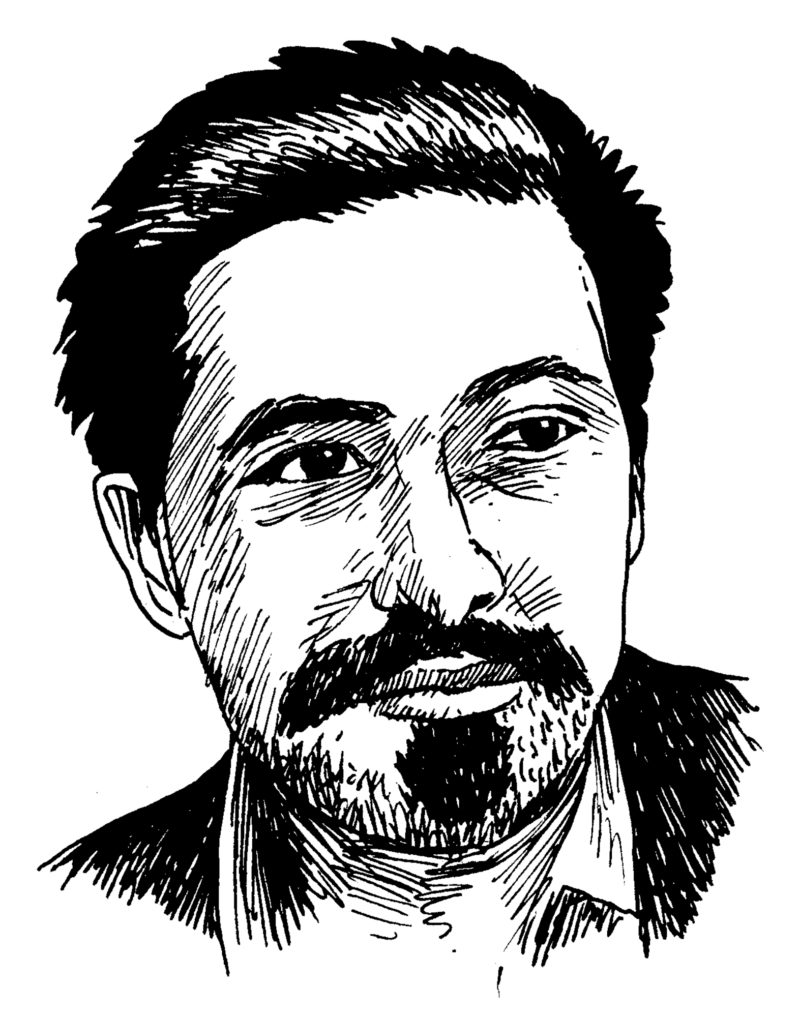
JOSE ORDUÑA
THE BELIEVER: What’s the earliest border you remember?
JOSE ORDUÑA: I’m an immigrant. My family came to the US from Mexico when I was two, on a plane, with a tourist visa. A very large proportion of immigrants, both documented and undocumented, come to the US with a tourist visa that eventually lapses, and then you are considered undocumented. That’s something that doesn’t get talked about a lot. That was the situation in my family.
BLVR: How did this border become real in your childhood consciousness?
JO: As a child, you like to integrate everything into some sort of cohesive whole.
BLVR: What got integrated?
JO: For as long as I can remember, INS and la migra were a thing. There were raids in Chicago, where I grew up. We knew people that got picked up. People you never saw again. People my dad worked with. I think children are a lot more sophisticated than we give them credit for, especially immigrant children or children who live in so-called rough neighborhoods, and I was both. From a very young age, I had to know and navigate stuff that other children didn’t have to know or navigate. My parents made a point of telling me to read about our situation. We were always talking about Mexican politics and Latin American politics, and how they related to the United States. I was aware of the things that caused migration. I was aware that we weren’t just seeking a better life, but that our country was made unlivable by the policies of the elite, of the Mexican political class and US foreign policy. It was part of my upbringing. It all got integrated.
BLVR: Have you ever made a border?
JO: When you’re doing work with activist groups, you can erect a border by creating a heuristic. When you talk about South and Central American migrants, I think it’s important to not have this sort of vague idea of Oh, no one is illegal. That’s wonderful sounding, but there’s no precision, and there’s no way forward in terms of actual mobilization. It’s important to say, We are Guatemaltecos. We come from Guatemala. We came during these years. This is why we came during these years. This is what was happening in our country. These were the specific policies that forced us to migrate. It’s strategically meaningful to situate mobilization in a context, to root what you’re fighting for.
LESLEY NNEKA ARIMAH
THE BELIEVER: Have you ever made a border?
LESLEY NNEKA ARIMAH: Well, if you think silence is a border, then yes.
BLVR: Thoughts on geographical borders?
LNA: Significant but complicated. My research is taking me to precolonial Nigeria. There was a cultural wealth there that was not exactly erased, but it was smoothed out. A genuine pearl is really rough, almost like an emery board. But a fake pearl is very smooth. And I think that precolonial Nigeria was a rough and textured pearl, but the British came, and they were like, This is one smooth, uncomplicated piece. We are now going to create false borders and call it Nigeria, and it doesn’t matter who’s in there, because, you know, it’s all the same, right? It exacerbated the growing pains of a country because, left to our own devices, this is not the country we would have selected. These are not the borders we would have chosen. It’s not a problem we created, but it’s a problem that we’re going to have to deal with, and, like, live through.
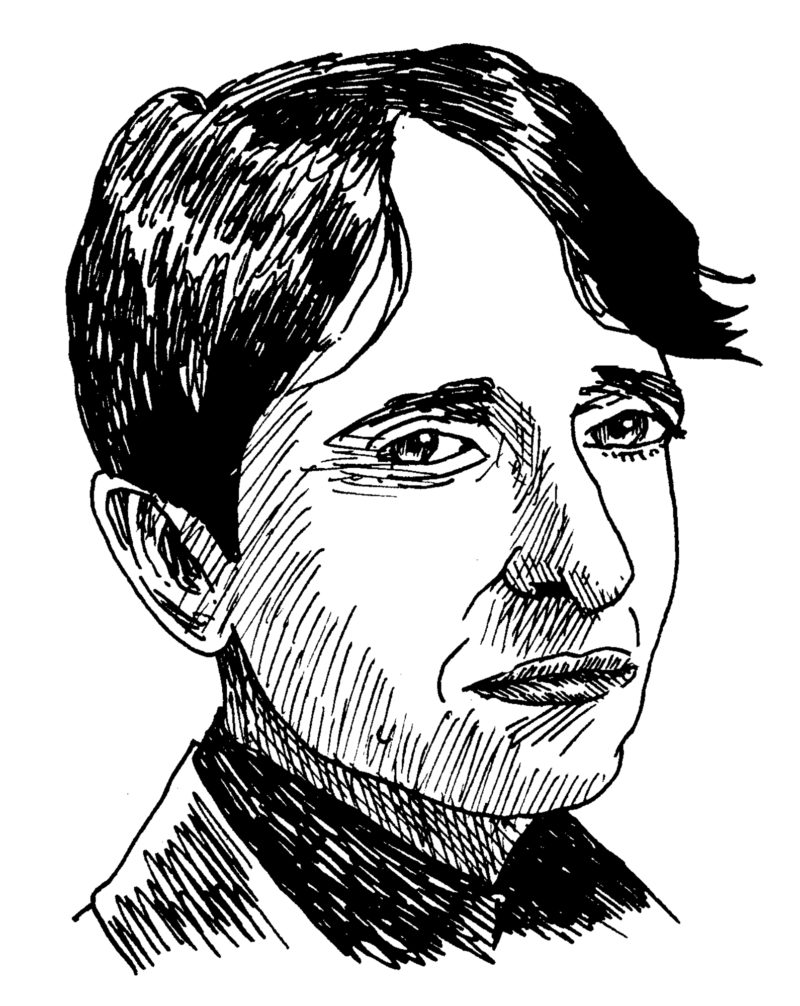
MASHA GESSEN
THE BELIEVER: The precision of your writing challenges me to question my assumptions about language and material reality, so, at the risk of sounding ridiculous, do borders actually exist?
MASHA GESSEN: Borders exist. I think their existence is inevitable, but has to be problematized. My attitude toward a borderless world is like my attitude toward democracy. It is something that can never be achieved; it’s a dream, and the measure of our success is whether we’re moving in the direction of that dream or away from it.
BLVR: My working definition of border, for this project, is “a delineation between two distinct spaces.” Does that work for you?
MG: No, that’s a boundary. That’s very different from a border. What’s important about a border is that it’s policed. We police borders between countries, we police borders between genders, we police borders between states of being, and the whole problem with borders is that they’re policed, right? And because of this, they’re inherently undemocratic. At a border, you’re being governed. And yet you have no say in that government, which is why borders are so problematic.
BLVR: What borders are you paying attention to this week?
MG: I’m working on a piece about the Irish system for treating people in need of international protection, which is this weird system called “direct provision.” In Ireland, they don’t give you money to rent a place and buy food; they give you shelter and food. This basically means you live in a kind of dormitory for a long, long time—I think eleven years is the record. People are physically in the country, but they’re not in the country. That’s a kind of border. They’re not learning the language, they’re not learning how to look for a job, they’re not learning how to pay an electrical bill. They become infantilized, and they don’t have a common project of learning something. They just have a common project of escaping, which is not much of a common project.
BLVR: Why not?
MG: Escaping is an individual project. This gets at the distinction between emigration and exile. When you emigrate, you go somewhere; it’s about the place where you are going. When you flee, you’re running away from something, and where you go is secondary, if it matters at all.
REGGIE WATTS
THE BELIEVER: What’s a border that you enforce?
REGGIE WATTS: This is gonna sound weird, but I enforce my right to be understood. I always seek to be understood. To clarify things. I spend so much time trying to be in sync in what I’m explaining that it really upsets me sometimes when someone is willfully not taking the time to understand a point of view.
BLVR: What border has been the most significant to you in your life?
RW: I practice this weird thing called “point of convergence”; it’s probably an OCD thing. I look for that in everything, like, What’s the point at which I hang a coat up and it just stops moving and no one can tell how long it’s been there? It’s like where the actual experience converges with an assumption. It’s like, I don’t know how long that’s been there. You know, someone just closing a car door and they lock it, and the mirror folds, and just as it stops folding you’re like, Oh, has that car been parked there? I mean, obviously, if it’s a gas car you can hear the engine, that’s fresh off the engine, but perceptually those moments exist everywhere. That’s a border for me ’cause it’s a point at which something crosses over into something else.
TOMMY ORANGE
THE BELIEVER: What is the first border you remember?
TOMMY ORANGE: We would go from Oakland and take these three-day-long trips to see my dad’s side of the family in Oklahoma, and that felt like a border, both of time and experience. Especially coming from Oakland and being from a white mom and a Native dad. You know, we’re supposed to have sovereignty as Native people, and it’s not really ever the case, but there is a land base and there is a place where Cheyenne people live that I would visit. But our Cheyenne relatives saw us as Native people from the city, which is not as authentic as their experience, so that felt like a border that we maybe never crossed.
BLVR: Is there a name for that?
TO: Well, “city Indian” and “sidewalk Indian” are old slanders. Or “urban Indian.”
BLVR: What’s the border that’s been the most important to you, positively or negatively?
TO: Authenticity is a big word for Native people—it is a border between who should be allowed in and who shouldn’t. And the border is not territorial. It has to do with experience as opposed to, like, territory. Experientially, what right do you have to claim being Native American? Especially as an urban native person, it’s harder to claim, because Native American–ness has so much to do with language and land, and if you have neither… My dad’s fluent—Cheyenne was his first language—but he didn’t teach us the language. So in writing a book and having it be received well in the Native community, I feel like I’ve been let inside a certain other kind of border of the Native lit world.
JANAYA KHAN
THE BELIEVER: What is the earliest border you remember?
JANAYA KHAN: When I got old enough to go to the grocery store with my mother, I left our public housing neighborhood, which was my entire universe. We took a bus, and then a train, and then another bus, and it was as if I was in an entirely different world—a world that didn’t know that mine existed at all.
BLVR: Have you ever made a border?
JK: Yes and no. I think we sometimes make islands of ourselves. When we’re not careful, when we think that our particular struggle is the most important one, there can be a lot of narcissism and sorrow. We can’t exist in islands. We are already in this together. And that means that I have to start taking shit that doesn’t impact me very personally and fight like it’s my struggle. Because if they’re coming for immigrants tonight, if they’re coming for Muslims tonight, they’re coming for me tomorrow.
ANDREW LELAND
THE BELIEVER: What’s the first geographical border you remember?
ANDREW LELAND: Oh, you wanna get geographical? Well… we moved to Toronto from New York after I finished kindergarten. I have a vivid memory of our cat, Frank the Cat, freaking out in the backseat with me as we crossed into Canada. It was way past my bedtime when we crossed the border. I remember the Snickers bar that my mom bought me and the ingredients were all in French and I was like, “We’re not in New York anymore!” That was probably my first sense of an international border, you know, late-night Snickers cat drama.
BLVR: What borders do you find you enforce in your life?
AL: That I enforce? Well, as a father of a six-year-old, I find the language of parenting is filled with the idea of setting boundaries. And it’s a difficult but essential art of being a parent, to say, “We never smear feces on other children” or whatever it is. The idea of the boundary itself isn’t necessarily controversial; it’s the enforcement of it. Not that it’s controversial, but it’s difficult. It’s also mutually agreeing with your partner about borders, like, “It’s Wednesday, so you’re allowed to have your sugary dessert.” This is so boring what I’m saying. Everybody else is gonna be like, As a political refugee, I have strong feelings about this, whereas I’m like, “I had a Snickers bar with French ingredients!”
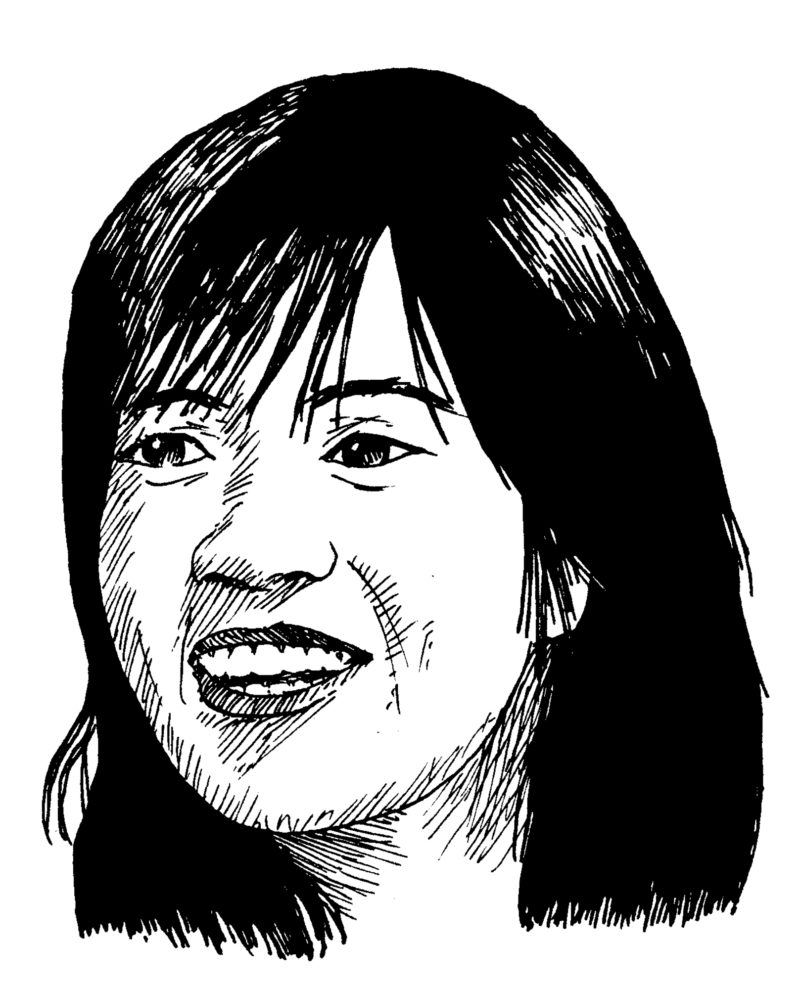
THAO NGUYEN
THE BELIEVER: What is the first geographical border you were ever aware of?
THAO NGUYEN: The first border I remember was the one between South and North Vietnam. My parents are both from South Vietnam and fled the war. They met in a refugee camp in Arkansas and then moved to North Carolina where they had my brother and then Virginia where they had me. Our house in Virginia had a wooden clock, in the shape of Vietnam. I would stare and stare at that thing because we didn’t have much else in our house and I was so so bored all the time. Saigon was marked with a the flag of South Vietnam. I’d look at that, and then my eyes would trace the wiggly curves of the perimeter and then the etched line that marked South from North. My parents didn’t talk about the war at all and hardly ever talked about Vietnam but it was always with us because of the clock. Every Vietnamese household we knew had one. I didn’t know much about the war besides our country was lost and do not mention communists.
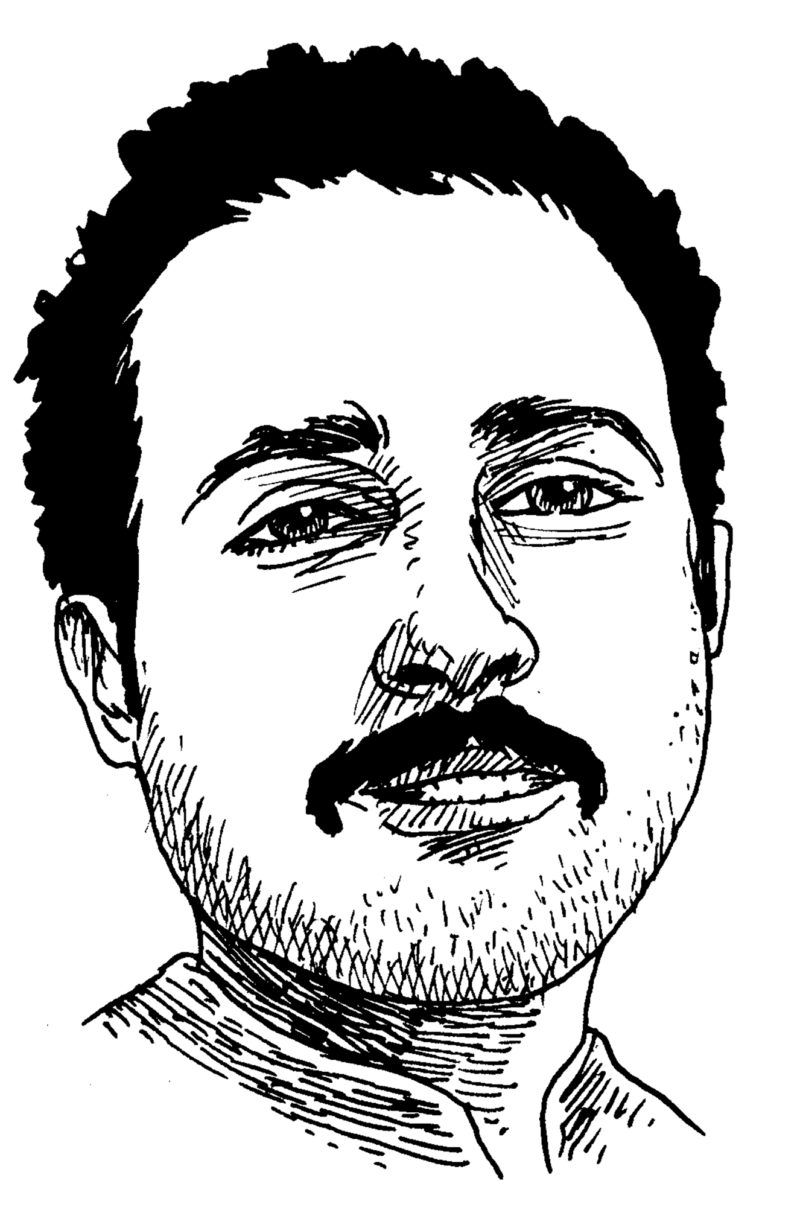
AHMED NAJI
THE BELIEVER: What borders from childhood do you remember?
AHMED NAJI: Children learn by borders, because we teach them how to move by saying, “You are not allowed to go there; you are not allowed to go there.” So borders also function as protection. Growing up in Egypt, we played on the roof, and the houses are very close, and so you’d have a house that had three floors next to a house that had two floors, and our parents would tell us, “Don’t run fast, and don’t run from building to building.” But I would always jump from roof to roof. And I got in trouble. It was my way of escaping, to jump through these borders.
BLVR: And in your adult life?
AN: As a writer, there are lines you can’t cross without consequences: writing about certain political issues, social issues, religious issues. If you write about social taboos, you could lose your family support. And society will blame you; they will look at you as a devil, so you will lose protection. For me, writing about these things ended up with me being in prison, which is the ultimate metaphor for the border.
BLVR: What happens at the US border for you?
AN: I’m Muslim, I’m Arab, so I’m used to [hassle]. The last time I came to the airport in the States, I gave the guy my paper, and he looked at my passport, and I said, without waiting for him, “OK, where is the detention room?” [Laughs] I know it’s going to happen, so I go, freely, without him. I was there for three or four hours. When I book a flight to the United States, I don’t book another flight for six hours, because it’s happened that I’ve been detained for six hours. I was on a trip organized by the State Department, funded by the State Department, and I was detained for six hours.
BLVR: Have you ever made a border?
AN: Yes. Like any human being, sometimes I stereotype people. Especially when coming into a new community. There is this thing about love and acceptance and so on, and that’s good, but the reality is, you don’t have to love everyone. Love is nice, and also, hate is nice. People need hate to appreciate life, to appreciate love.
BLVR: Hate is necessary to love life?
AN: We are not angels. We are human beings. We form our communities through things that connect us, and this can mean building walls. But there are all kinds of walls that you can build. They don’t need to be opaque. They can have doors. They can have windows.

